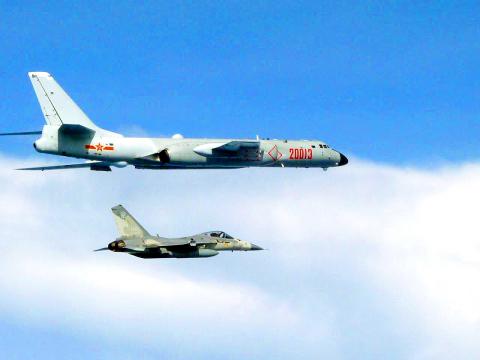Taiwanese will gradually get used to Chinese air force drills that encircle the nation, China said yesterday, while Premier William Lai (賴清德) reiterated the nation’s desire for peaceful relations with Beijing.
China has taken an increasingly hostile stance toward Taiwan since President Tsai Ing-wen (蔡英文), of the Democratic Progressive Party (DPP), last year won the presidential election, and has stepped up its rhetoric and military exercises.
Beijing suspects Tsai of pushing for Taiwanese independence, a red line for China.

Photo courtesy of the Ministry of National Defense
Tsai said she wants peace with China, but also that she would defend Taiwan’s security and way of life.
Chinese state media has given broad coverage to “encirclement” exercises near Taiwan this month, including showing photographs of Chinese bombers with what they said was Taiwan’s highest peak, Yushan (玉山), visible in the background.
Asked about the continuing drill’s and the footage released by the air force, China’s Taiwan Affairs Office said it and the Chinese Ministry of National Defense had repeatedly described the exercises as routine.
“Everyone will slowly get used it,” office spokesman An Fengshan (安峰山) told a routine news briefing, without elaborating.
The Chinese People’s Liberation Army (PLA) has carried out 16 rounds of exercises close to Taiwan in the past year or so, the Taiwanese Ministry of National Defense said in a white paper this week.
China’s military threat was growing by the day, it added.
The government has accused Beijing of not understanding democracy when it criticizes Taipei.
The US, Japan and South Korea are paying close attention to the PLA’s activities, Lai said at an end of year news conference in Taipei.
“Under the president’s leadership, the Executive Yuan pushes forward government affairs, stabilizing cross-strait relations toward peaceful development,” Lai said.

INVESTIGATION: The case is the latest instance of a DPP figure being implicated in an espionage network accused of allegedly leaking information to Chinese intelligence Democratic Progressive Party (DPP) member Ho Jen-chieh (何仁傑) was detained and held incommunicado yesterday on suspicion of spying for China during his tenure as assistant to then-minister of foreign affairs Joseph Wu (吳釗燮). The Taipei District Prosecutors’ Office said Ho was implicated during its investigation into alleged spying activities by former Presidential Office consultant Wu Shang-yu (吳尚雨). Prosecutors said there is reason to believe Ho breached the National Security Act (國家安全法) by leaking classified Ministry of Foreign Affairs information to Chinese intelligence. Following interrogation, prosecutors petitioned the Taipei District Court to detain Ho, citing concerns over potential collusion or tampering of evidence. The

‘FORM OF PROTEST’: The German Institute Taipei said it was ‘shocked’ to see Nazi symbolism used in connection with political aims as it condemned the incident Sung Chien-liang (宋建樑), who led efforts to recall Democratic Progressive Party (DPP) Legislator Lee Kun-cheng (李坤城), was released on bail of NT$80,000 yesterday amid an outcry over a Nazi armband he wore to questioning the night before. Sung arrived at the New Taipei City District Prosecutors’ Office for questioning in a recall petition forgery case on Tuesday night wearing a red armband bearing a swastika, carrying a copy of Adolf Hitler’s Mein Kampf and giving a Nazi salute. Sung left the building at 1:15am without the armband and apparently covering the book with a coat. This is a serious international scandal and Chinese

Seventy percent of middle and elementary schools now conduct English classes entirely in English, the Ministry of Education said, as it encourages schools nationwide to adopt this practice Minister of Education (MOE) Cheng Ying-yao (鄭英耀) is scheduled to present a report on the government’s bilingual education policy to the Legislative Yuan’s Education and Culture Committee today. The report would outline strategies aimed at expanding access to education, reducing regional disparities and improving talent cultivation. Implementation of bilingual education policies has varied across local governments, occasionally drawing public criticism. For example, some schools have required teachers of non-English subjects to pass English proficiency

TRADE: The premier pledged safeguards on ‘Made in Taiwan’ labeling, anti-dumping measures and stricter export controls to strengthen its position in trade talks Products labeled “made in Taiwan” must be genuinely made in Taiwan, Premier Cho Jung-tai (卓榮泰) said yesterday, vowing to enforce strict safeguards against “origin laundering” and initiate anti-dumping investigations to prevent China dumping its products in Taiwan. Cho made the remarks in a discussion session with representatives from industries in Kaohsiung. In response to the US government’s recent announcement of “reciprocal” tariffs on its trading partners, President William Lai (賴清德) and Cho last week began a series of consultations with industry leaders nationwide to gather feedback and address concerns. Taiwanese and US officials held a videoconference on Friday evening to discuss the